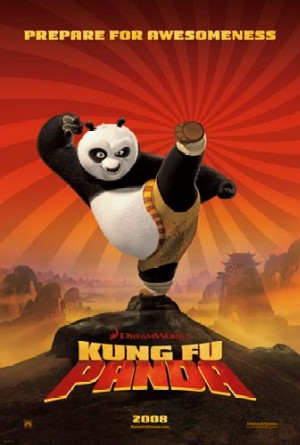
I’ve seen meaning to make this post since I got around to finally watching Kung Fu Panda a couple of weeks ago but didn’t find the time. It’s an awesome film as its poster claims, but more importantly, it’s an awesome kung fu film, easily the best one of the year, and it was made entirely in the U.S. This makes it a great example of a point that I’ve been wanting to make. One of my pet peeves is that whenever some Chinese patriot tries to make a case for Chinese nationalism, the issue of Chinese culture and its 5,000 history invariably crops up. This is annoying for two reasons.
One, it seems to imply that Chinese culture and history is somehow better, or more special, than that of any other solely by reason of its longevity. As this old article explains, that’s a poor argument. Chinese culture is indeed worthy of attention and study, but then nearly every corner of the Earth is just as steeped in history. Chinese apologists try to make the argument that Chinese identity is unique in that it alone of all other cultural identities in the world can trace an unbroken lineage up to 5,000 years back, but as the article also explains, that relies on a rather slippery definition of what China, and what being Chinese, means.
Two, it seems to draw some kind of privileged connection between the Chinese government of today, the one that’s run by the Communist Party of China, and the 5,000 year old Chinese culture. The thinking is that all Chinese, wherever they are in the world and whatever nationality they actually hold, owe if not loyalty, then a certain kind of reverence towards China. The idea seems to be that the People’s Republic of China, simply by virtue of holding temporal power over the same geographic territory as the many previous Chinese empires of old, is somehow the legitimate successor of those empires and the rightful champion of Chinese culture.
Kung Fu Panda turns all this on its head. Not only did it confound expectations by doing extremely well in China (Crouching Tiger, Hidden Dragon by contrast bombed at the Chinese box office despite the international kudos it earned), its portrayal of Chinese culture feels so authentic that it’s provoked some soul searching as why the Chinese didn’t come up with a hit like it themselves. It’s worth noting that while some Chinese protestors have tried to talk down the film, such as performance artist Zhao Bandi’s attempts to have the film banned for exploiting the panda as well as kung fu, others have rushed to defend it. As one commenter in the article noted, “China’s cultural heritage belongs to the world.”
Indeed it does, and this is what I’ve long felt as well. Chinese culture isn’t some homogenous set of beliefs and practices that belongs to a particular group or nation. It’s the result of history, and as such, is a messy collection of beliefs, arts and practices. In fact, the makers of Kung Fu Panda, despite not being Chinese, have contributed more to Chinese culture by making the film than the vast majority of actual Chinese people living today. This is because culture is a living, changing thing that needs to be constantly renewed and reinvented if it is to survive.
In the same way, when an ethnic Chinese claims to be proud of Chinese culture, it rings hollow to me. After all, you, personally, probably contributed nothing to making Chinese culture what it is, so such claims of pride constitute nothing more than basking in reflected glory. It’s great if you as a Chinese genuinely admire Chinese culture, and are impressed by the achievements of the Chinese civilization. Just remember that everyone else is similarly entitled to study and enjoy it as well. But admiring Chinese culture wholesale just because you happen to be ethnically Chinese doesn’t make you a better person. It just makes you seem a little stupid, because remember, things like feet binding are just as much a part of Chinese culture as anything else.
In multiracial Malaysia, the issue is more than just pedantic. Many Chinese Malaysians who are unhesitant about claiming for equal rights as citizens of the country are still reflexively defensive about criticisms directed towards China, the issue of Tibet being a particularly good bellwether of such attitudes. I’d just like to remind people that it’s okay to be against the government China while still being an admirer of Chinese history and culture, just as it’s okay to be Chinese without being much interested in Chinese culture.
3 thoughts on “Culture. Who owns it?”